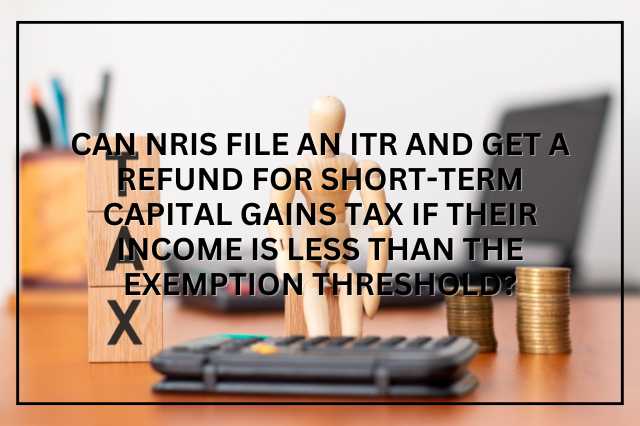
loading...

Can NRIs file an ITR and get a refund for short-term capital gains tax if their income is less than the exemption threshold?
I'm an NRI. In India, my sole source of income is from stock investments made through a PIS (Portfolio Investment Scheme) account, where all capital gains are subject to tax deductions at the source. I will make less than Rs 2.5 lakh in total short-term financial gains. Since my taxable income is less than Rs 2.5 lakh, can I file an ITR to get a refund of the tax that was withheld? Expert Advice: In accordance with Indian tax regulations, some incomes—such as interest, company income, and salaries—are taxed at special rates, while others are taxed at slab rates. For instance, listed shares and equity-oriented schemes are subject to special rates of 12.5% and 20% for long-term capital gains (LTCG) and short-term capital gains (STCG), respectively. The difference between their basic exemption limit and the LTCG or STCG from listed shares and equity schemes can be deducted by resident taxpayers. An 85-year-old resident, for example, who has a normal income of Rs 3 lakh and an STCG of Rs 5 lakh, can deduct Rs 2 lakh from their exemption limit (Rs 5 lakh for super seniors) and only pay taxes on the remaining Rs 3 lakh. For NRIs, the taxation of short-term capital gains (STCG) on listed shares and equity-oriented mutual funds is governed by Section 111A of the Income Tax Act. These gains are taxed at a flat rate of 20%, regardless of whether your total income falls below the basic exemption threshold of Rs 2.5 lakh. Unlike resident taxpayers, NRIs cannot adjust their basic exemption limit against such gains, which means the benefit of reducing taxable income using the threshold does not apply. Since taxes on STCG are deducted at source through the Portfolio Investment Scheme (PIS), NRIs often end up paying tax even when their overall income is relatively small. However, this deducted tax does not always reflect the actual liability. To reconcile this, NRIs are required to file an Income Tax Return (ITR) in India, where they can disclose their income, calculate the correct tax liability, and determine whether excess tax has been withheld. If the tax deducted at source (TDS) is higher than the actual tax payable, the NRI becomes eligible for a refund. Filing the ITR ensures that such overpayment is identified, and the refund is processed by the Income Tax Department. For example, if your total income from short-term capital gains is under Rs 2.5 lakh but TDS has still been deducted, reporting this through ITR enables you to claim back the excess amount.
Just Login and Customize
Our Features Easily.
USERNAME : [email protected]
PASSWORD : admin1234